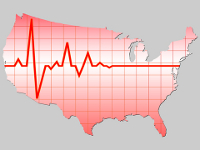British expats moving to the US must ensure that they have comprehensive health insurance coverage. While the UK benefits from the National Health Service (NHS), medical care in the US is, and always has been, a private business. The cost of treatments if you take a risk without being fully covered, are not recommended. One day in the hospital can easily run up to $4,000, even the simplest of treatments and surgery can rack up bills up to $50,000, and a major illness higher still.
What type of cover do I need?
The insurance cover you need depends fully on your personal circumstances. Factors include which city and state you are moving to, your employer, your family, as well as health questions such as any pre-existing medical conditions, the health of your parents, your habits (e.g. smoking) and how much exercise you do.Insurance differs greatly and it is crucial that you read the small print on any insurance documents (and often there are pages and pages of information).
While some insurance policies have high premiums (monthly payments) and low deductibles (out of pocket expenses), others have high co-pays (fees you pay each time you see a doctor).
Not all health insurance covers every illness and some specify which doctors or area you must use healthcare to be fully covered. The wording of the policy will explain what is not covered, for example dental care or mental health illnesses.
Abbreviations you may come across include the HMO which is the Health Maintenance Organization, a system of screening nurses, doctors and hospitals working together under a certain procedure and the PPO or Preferred Provider Organization, a system where you pick a local doctor and hospital to use who negotiates a decent price with the insurance company.
Where can I get health insurance from?
The majority of people in the US get their health from their employer and this is either paid in full or in part by them, or fully by you. Some companies offer a group benefit, which offers savings and a range of policies to choose from. Otherwise, the plan you need is an individual one, which costs more. There are many health insurance companies available, and the key is to do some research on the best for you and your family’s needs.
Some companies refuse people with a pre-existing condition, however, if you have been covered by a national insurance system, such as the NHS in the UK, pre-existing conditions are covered if you are joining a group (not individual plan) and you must join within 62 days of arriving in the US.
What can I expect from healthcare in the US?
Once you have cover, the healthcare you will receive in the US is likely to be of a high quality.
When you sign up to an insurance plan, you will be issued with a card and number to keep. The insurance company can provide a list of doctors who are covered by the insurance policy and your first visit to a doctor will involve a large amount of paperwork. After a visit, the doctor’s office normally submits the bill directly to the insurance company and any queries or issues from the insurance company are followed up with you directly. If something is not covered by the policy, it is advised to argue your stance with the company and possibly involve the doctor. If the bill must still be paid, you will need to pay the doctor directly and keep the receipt for tax purposes. Specialists and pharmacists work in much the same way as a GP.
In an emergency, by law, a hospital cannot refuse to treat an emergency patient due to their ability (or inability) to pay and once admitted to hospital, insurance is not discussed until the patient is stable.
It is important to note that insurance companies make mistakes and it is the individual’s job to read the bills provided and check for any errors. It is also an idea for individuals to argue with insurance companies over their rights. The company exists to make money – remember this at all times.
Many changes are likely to take place with the healthcare service in the US over the coming years; however, these will take time to be implemented. In the meantime, there exists a number of problems with the current system. These include those who are uninsured and take a risk, those who decide against visiting a doctor and put their health at serious risk in the long term and those with large families who pay huge costs per month for insurance. Some help is available for the poor and the elderly, but expats are generally not covered by these plans.
US residents know no different and have always paid for their healthcare, but expats from the UK will need to adjust to big changes in their healthcare cover and rights. This, in itself, will be a shock to the system and you will be craving the ease of using the NHS back home.

